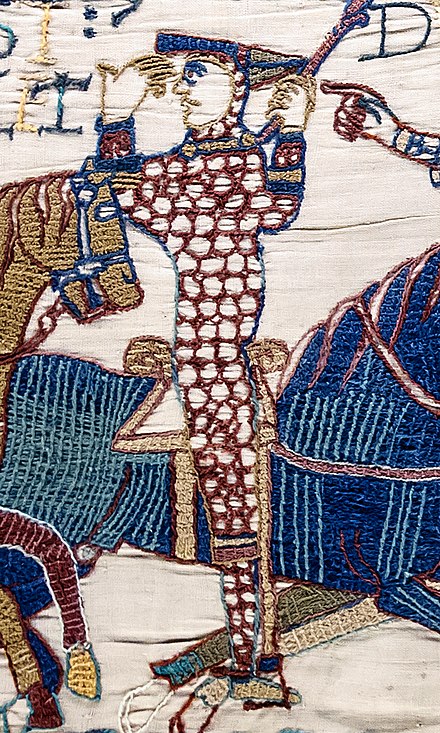There’s an indescribable something about being stuck somewhere, waiting for the plane to arrive, and having nothing to watch but a horror film which I thought at first was Invasion of the Frog-Faced Chinless People, but which turned out to be the coronation of Charles III of the United Kingdom.
I am not by any stretch a monarchist, but I watched in the same spirit with which I always watch the peculiar ceremonies of a far-away people. The coronation was long and for the most part dull, though there were occasional moments of interest. I never thought to hear an entire chorus chanting “Vivat! Vivat Camilla!” and I suspect neither had she. I liked the part where Charles was presented with the magic bracelets, presumably borrowed from Wonder Woman. I liked his single glittery Michael Jackson glove. But none of this was anything like the excitement surrounding the very first king to be crowned at Westminster Abbey, William the Conqueror.
Pop history a la 1066 and All That tends to leave us with the impression that William won the Battle of Hastings and got to be king right away, but that’s not what happened. The English Witenagemot (“Witan-Moot,” a sort of assembly of notables) met in London after Hastings and elected a new king, Edgar the Atheling, a teenager and the last living male of the House of Wessex once headed by Alfred the Great.
William’s claim to the throne rested on his assertion that the previous king, Edward the Confessor, had secretly promised him the throne. There weren’t any witnesses or anything, you just had to take William’s word for it. In fact he had previously been just as secretly promised the County of Maine, which he conquered just as soon as its previous count croaked.
William’s attitude was simple:
- I am the rightful king of England. Because.
- I’m also the rightful count of Maine. Because because.
- Anyone who opposes me is therefore a traitor, and deserves any punishment I care to give him.
William thoroughly deserved his alternate title of William the Bastard. He was barely literate, uninterested in art or literature, and spent his whole life at war, beginning when he was a child. (Admittedly not entirely his fault.) He ruled through terror, and generally terror got him what he wanted.
So William slaughtered his way up to London, sacked Dover and Canterbury (burning down its Cathedral), and carved a bloody circuit around London. There was a side trip to Winchester, the Saxon capital, to capture the royal mint and the gold and silver reserves. Towns burned, men slain, women raped, churches looted, crops confiscated or destroyed. So thorough was the pillaging that the Domesday Book, 20 years later, reported the area as half devastated and underpopulated.
Many if not most of William’s soldiers were mercenaries. Letting them get their pay by stealing it off the English was an economical solution.
The English nobility submitted, including Edgar the Atheling. The nobility were basically a clutch of self-interested rich fucks, and thought that submission meant they got to keep their stuff. (They didn’t know William. If people had already surrendered, that just made them easier to loot.)
Also, all the brave English nobles were killed at Hastings. A proper resistance, using the English militia system, would have finished William off in short order, but there was no one to lead them, just the unproven teenage sons of the thanes who had died at Hastings.
So William decided to make a big show of getting crowned at Westminster Abbey just to show everyone who was in charge. His noble supporters crowded the chapel, while the rest of the army waited outside. Eventually the army heard a shout from the Abbey, and assumed that meant William had just received his crown. (William hadn’t got the crown yet, the shout was over something else.)
The army decided to celebrate. And what better way than to loot and burn the City of London? So they ran amok, killing and looting and setting fires.
Word reached the nobles that the city was being looted, so they charged out to join the fun. Eventually William was left alone in the chapel with a few elderly clergymen, and hardly anyone saw his coronation. When he stepped outside, all he saw was his new capital city on fire.
I doubt it bothered him much.
Well those were the days of chivalry, when knights were bold and sans reproche, and peasants were there for the killing. Now there’s hardly any looting (except for tourists and their dollars), and instead of a massive riot and slaughter, we got four and a half hours of dull television.
Vivat, y’all.

“I am not by any stretch a monarchist …”
Yes, we gathered that from the rest of the essay. 🙂
I will note two of your series are about the shenanigans of monarchical systems. Of course, neither the Praxis nor Quillifer really shine a positive light on feudalism. It seems to mostly be “how can I exploit the system for personal gain…”
They did manage a few arrests to liven things up.
Should you ever tire of writing science fiction, consider humorous history. I had to read the whole thing aloud to my wife. 🙂
Comments on this entry are closed.